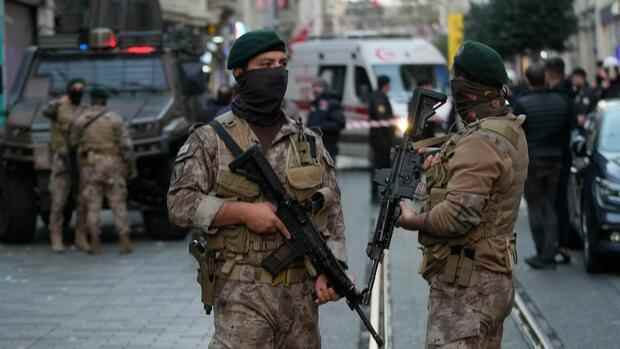Istanbul The attack on Istanbul’s Istiklal Avenue on Sunday afternoon, which left six dead and injured 83, has already had political consequences – and will make cooperation with the country more difficult in the future.
A bomb in a backpack is said to have exploded in the shopping street in downtown Istanbul on Sunday afternoon, unconfirmed security camera footage shows. A person believed to have left the backpack and 21 other suspects were arrested.
Shortly after the explosion, President Recep Tayyip Erdogan spoke of a terrorist attack: “The efforts to subdue Turkey and the Turkish nation through terrorism will not be as successful today and tomorrow as they were yesterday.”
The attack brings back memories of the terror series in 2015 and 2016. Over a period of 18 months, there were almost daily attacks, the most violent of which killed 103 people. At that time, the government tightened many security measures and restricted civil liberties. The series of attacks was also the beginning of numerous diplomatic crises with partner countries, including the USA, Germany and other NATO member states.
Top jobs of the day
Find the best jobs now and
be notified by email.
The same threatens now, as the first developments and statements indicate. For example, from Interior Minister Süleiman Soylu: “The order for the attack came from the northern Syrian city of Kobani,” he said on Monday morning. The minister also blamed the United States. A condolence message from the White House would be like a “murderer showing up first on the scene.”
Terror in Turkey: Consequences for the relationship with NATO
Turkey accuses the US of supporting the PYD, the Syrian offshoot of the banned Kurdish Workers’ Party PKK. It is precisely this group that is now being blamed for the attack. The evidence pointed to the PKK and the PYD, Soylu said. At the end of September, members of the PKK killed a police officer in an attack in Mersin, southern Turkey.
>> Read here: Possible Turkey accession to NATO competitor: Erdogan is unimpressed by criticism
The allegations could not only have consequences for the relationship between Ankara and Washington, but also for the relationship with NATO candidate Sweden. After the Russian invasion of Ukraine, the government in Stockholm decided to join the western defense alliance. Turkey is blocking membership on the pretext that Sweden supports terrorist groups like the PKK and PYD.
A visit by the new Swedish Prime Minister Ulf Kristersson to Ankara last week did not bring the desired breakthrough in the negotiations. Turkey is demanding tougher action by the authorities against members of the groups living in Sweden. This blockade by the Turks is likely to intensify further after the attack.
The Turkish President continues to oppose Sweden joining NATO.
(Photo: AP)
Domestically, the Turkish government has already tightened the reins. A news blackout was imposed immediately after the attack. This should stop speculation about the explosion. Twitter and Instagram were now almost unavailable. The tragic irony of this strategy is that many members of the government nevertheless announced their official announcements on the short message platform first.
The first major assassination attempt in more than five years is causing a great deal of excitement, also because of the presidential and parliamentary elections that are due to take place in June 2023 at the latest. The ruling coalition of AKP and MHP is in danger of losing its majority.
Sunday’s explosion was the first major attack in more than five years.
(Photo: AP)
Speculation quickly arose that the government could use the latest attack politically to unite the population behind the fight against terrorism so that they would back the proven incumbent Erdogan in the elections.
According to this theory, Erdogan, as long-serving president, has a better chance of convincing people of his abilities in the fight against terror. The opposition, on the other hand, has not yet been able to actively prove itself in this area and is therefore losing favor with voters.
AKP benefited from its anti-terror actions
As early as November 2016, Erdogan had announced tough action against terrorism. “From now on we will no longer wait until we are stuck in the morass ourselves,” he explained during a speech, “but will take action before the threat reaches us.” This was followed by military and gendarmerie operations both in our own country and in northern Syria and northern Iraq. Just two days ago, a Turkish non-commissioned officer was killed in a military operation in northern Iraq.
>> Read here: Erdogan wants to convince voters with projects worth billions – Putin could give him the leeway to do so
So far, the theory is purely speculative, but it still seems logical to many people. “It is not normal that as soon as the bomb exploded, everyone immediately thought about the elections,” wrote a Turkish Twitter user on the news platform.
There was no clear majority for the AKP in the June 2015 elections, so the government called new elections five months later. The attacks began shortly thereafter. In the new elections in November of the same year, it was enough for the majority.
More: The new armaments giant – Turkey is becoming a problem for NATO.
